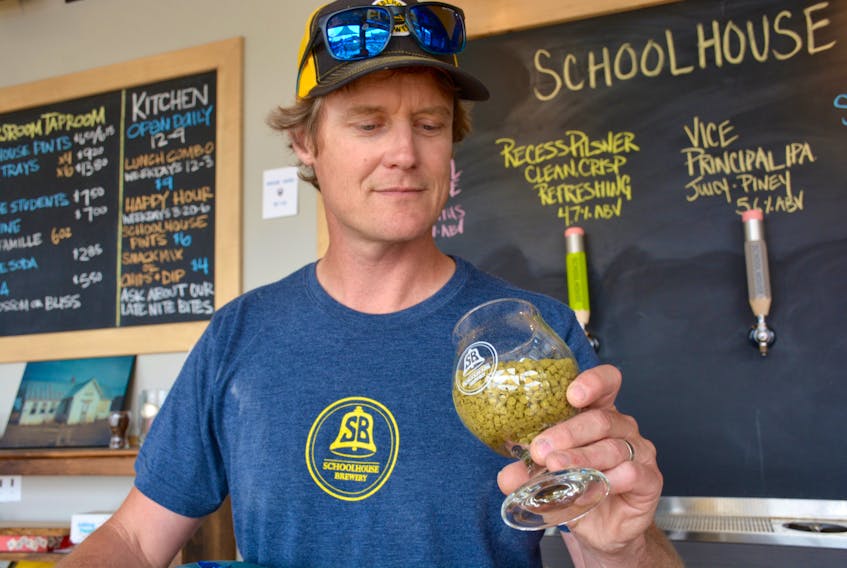WINDSOR, N.S. — What better a way to enjoy a summer afternoon relaxing on the patio than with beer in hand, and your dog at your side?
That was what Cam Hartley, owner of Schoolhouse Brewery in Windsor, thought when he allowed well-behaved dogs onto the patio at his business earlier this summer.
That, however was not something the health inspector agreed with, noting after he investigated a complaint, that Hartley was in violation of food safety laws.
Two years ago, when the brewery opened on Water Street, Hartley noted they only sold beer, boasting a dog-friendly patio. Eventually, Schoolhouse extended its offerings to include food.
“We were under the impression that it was okay, since it had never been a problem,” Hartley said. “We had operated under the assumption that well-behaved dogs were welcome on patios, and that it was at the discretion of the owner.”
That, however was not the case. Following a complaint, a food inspector visited the brewery, performing a full inspection without a hitch – until the end, when they asked about dogs on the patio.
“He said we were in violation of food regulations,” Hartley said.
When Hartley pressed the inspector on the issue, he was told having dogs on the patio – whether well behaved and on leashes or not – was a food safety issue.
RESPONSE AND REGULATIONS
After the food inspector’s visit, Hartley noted he was frustrated over the restriction imposed upon his business.
“We’re a neighbourhood watering hole. I think it’s kind of great when people can walk their dogs and sit on the patio, enjoy a pint and walk home,” Hartley said. “Those are the healthy habits of our customers.”
To avoid disrupting those customers’ healthy habits and trying to find a way to allow dogs on the patio, Hartley researched the matter. He discovered other jurisdictions in Canada and beyond with looser laws, or laws that allow easier access for dogs to designated outdoor patio spaces.
Hartley referenced Alberta as one such jurisdiction with more permissive laws.
Hartley noted that if Albertan restaurant and bar owners can apply for permits specific to their business, to allow dogs on their patios, then he should be able to as well.
James Wood, a spokesperson for Alberta Health Services, confirmed what Hartley implied, noting that the Alberta Health Service (AHS) has authority to grant permits for live animals for food-permitted facilities.
According to the Alberta Gaming and Liquor Commission Handbook, there are looser regulations in place for what constitutes patio space, relating to what can enclose an outdoor patio (ropes, planters or a low railing), which allows for easier access to dogs outside the designated patio space.
In Alberta, patios don’t need to be directly attached to a business selling food and liquor and can be adjacent to benches and public spaces that are not bound by the same regulations as the patio itself.
PROPOSAL
With all of that information in mind, Hartley drafted a proposal. He stipulated what his business does, and “trying to imagine every scenario that would have to come into play,” considering any scenario in which a dog could contaminate someone’s food and what measures his business takes to prevent that from happening.
Hartley sent that official request but was officially denied.
“They said they felt like it poses a public health risk,” he noted. “I went about this in an above-board way, and I think their decision is wrong. I don’t feel it’s a risk.
“I feel that dogs are part of people’s families, and if someone wants to bring theirs down, as they drive through the Valley, I don’t want them to leave their dog in the car or tied up outside the establishment.”
EVIDENCE-BASED POLICY
Hartley expressed suspicion over the evidence and facts that determine the laws he’s dealing with.
He alluded to the more permissive laws in other jurisdictions he read about as proof that Nova Scotia’s regulations don’t make sense.
“I think Nova Scotia’s policy should be based on evidence,” he said. “If a dog is on the patio, it’s not going to the kitchen. If we drop cutlery on the ground, whether there’s a dog around or not, we’re not going to give it to the customer.
“If we follow hand washing procedures and other regulations and don’t let dogs into the food establishment, and only let them on the patio, how is food contamination going to happen?”
NOT ALONE
Hartley emphasized he’s not alone in his plight, alluding to similar problems encountered by several Halifax-based establishments, such as Brightwood Brewery, Stubborn Goat and Good Robot.
“A lot of bright, vibrant downtown businesses have been hit with this same story,” Hartley said. “An anonymous complaint coming in, the food inspector showing up and telling them, ‘no dogs on the patio, or you’re getting shut down.’”
Although he feels like the laws pertaining to his business are a thorn in his side, Hartley expressed gratitude to the public.
“We have the support of our public and customers,” he said. “There are a few people who believe it’s a mistake, and there’d be negative consequences.”
Another side, Hartley noted, is that he has to respect all sides of the equation, acknowledging there are people who don’t like dogs.
“We hope that if a customer is uncomfortable, they can meet inside the establishment and enjoy the inside,” Hartley said. “We think that by far, most customers find the experience is enhanced when they can come out, sit on the patio, and enjoy a beer and snack.”
Hartley stressed the danger of alienating entrepreneurial businesses in Nova Scotia, a place where the economy needs innovation and initiative, by robbing them of their ability to create vibrant spaces.
“Those attract a young demographic and that’s the demographic we need in rural Nova Scotia,” Hartley said. “I think it’s time to revisit them, because they’re unprogressive regulations.”
NEXT STEPS
Hartley isn’t sure where to go next. Feeling thoroughly “under the thumb” of the food inspection agency, he noted he can appeal the decision – but officials can keep denying him.
“If I let dogs on my patio, they can take away my food license. That’s a key part of this business,” Hartley said.
Hartley noted he has spoken to Kings-Hants Liberal MP candidate Kody Blois about this issue, and is keeping him abreast of what is going on.
LEGAL REALITY
To address the mater, Rachel Boomer, communications director for the Nova Scotia Department of Health alluded to Section 39 (1) of the Nova Scotia Health Protection Act.
That section states that in Nova Scotia, pet dogs aren’t allowed in restaurants, bars or anywhere with an eating establishment permit.
“This helps reduce the risk of food contamination,” Boomer wrote in an email to Kings County News. “Our public health officers are happy to discuss individual scenarios with restaurant owners to help them comply with our regulations. We made this offer to the owner of Schoolhouse Brewery.”
Boomer added that if an establishment is only selling liquor and not food, it doesn't require an eating establishment permit, and the food safety regulations restricting dogs on the patio would not apply.









